If you own a health, veterinary, or dental practice and you’re tired of handling all the repetitive, day-to-day administrative tasks yourself, then it might be time for you to hire a virtual assistant.
With the help of a virtual assistant, you can boost the overall productivity of your practice, and you’ll finally have more time to work on important tasks rather than mindless admin.
But what exactly is a virtual assistant? What are their responsibilities? And how can you hire one?
This article will go into detail about everything you need to know about hiring a virtual assistant, including their responsibilities, how much you’ll have to pay them, how they’ll benefit your business, and more.
What is a virtual assistant?
A virtual assistant (VA) is an independent contractor who provides administrative services to busy business owners. They work remotely and help those business owners with small, mundane tasks that the owners don’t have time to do themselves.
VAs usually work part-time and have a few different clients they work with daily, weekly, or monthly.
In today’s busy working environment, more and more business owners need assistants to get through their tasks without burning out.
According to the Bureau of Labor Statistics (BLS), employment of in-office secretaries and administrative assistants is expected to decline by 7% from 2020 to 2030.
One of the reasons for this could be that companies are realizing that virtual assistants are an excellent alternative since they perform the same tasks but at a lower cost.
Get a virtual assistant for your practice today.
What types of companies do virtual assistants work for?
There are several different industries that virtual assistants work in. The most popular ones include:
- Law firms
- Digital marketing agencies
- Medical practices
- Veterinary clinics
- Information technology
- Real estate
- Tech startups
- Etc.
Responsibilities of a virtual assistant
There are no set tasks that a virtual assistant performs since their assignments depend on what their employer needs. That being said, here’s a list of some of the most common virtual assistant services:
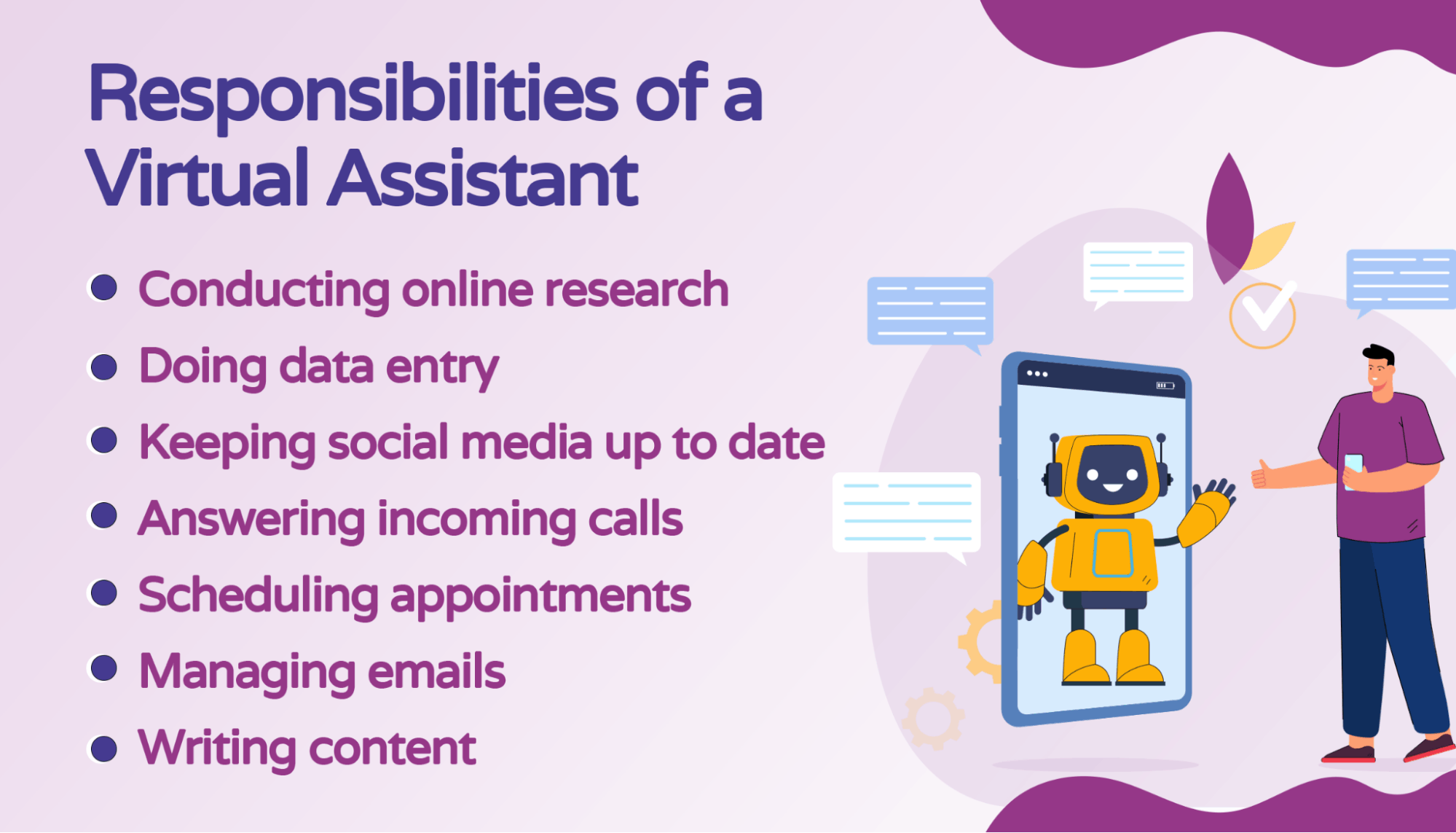
Administrative services
Managing email accounts: Making sure that all emails are answered and that important messages are relayed to the employer.
Making and answering phone calls: Answering and making phone calls whenever a client or supplier calls or needs to be reminded of a meeting.
Scheduling appointments: Scheduling appointments on the company’s calendar or system. They also need to manage the calendar to make sure that no double bookings have been made.
Preparing presentations: Creating presentations (such as proposals or solutions) that the employer will present to a client or partner. The assistant is responsible for adding logos, including the right colors and images, as well as adding animations if necessary.
Data entry
Data entry involves compiling data, checking for accuracy, and deleting records that the business no longer needs. Data entry is an especially useful service for patient recording and billing.
Not only will this organize the system and keep all records up to date, but it’ll also likely improve the system’s speed and efficiency — making processes run smoother and faster.
Discover the advantages of outsourcing your data entry.
Customer service
For many service companies, virtual assistants are often the first point of contact.
Therefore, they’re responsible for answering customer questions, troubleshooting, and giving feedback whenever possible — so that their employer doesn’t have to deal with these questions or concerns themselves.
If the virtual assistant isn’t able to help the customer, patient, or supplier, the issue is sent to the appropriate person.
Some virtual assistants also offer additional services, such as graphic design, social media management, blog writing, and marketing.
Online research
Virtual assistants often conduct market research to make sure that the business or practice is kept up to date about the market, its customers, competitors, and the overall movements of the industry.
They’ll also sometimes be required to look at the business’s Google Analytics or Facebook Page Insights to gather information about how well the company is doing online. From their research, they’ll be able to make suggestions on how content can be improved to attract more customers.
Additionally, they can conduct research about new products or services on the market that the practice might benefit from.
Virtual assistant requirements
Here’s some info about the education and training that virtual assistants need.
Education
While many virtual assistants can work with only a high school diploma, some employers prefer that they have post-secondary education (especially in highly technical industries like healthcare). A certificate, diploma, or bachelor’s degree in a particular field is helpful — especially when the assistant needs to perform specialized tasks.
Depending on the industry, a VA can have qualifications in a variety of fields. For example, in the medical industry, it is extremely useful if a virtual assistant is a registered nurse since nurses know a lot about the field and can provide better service and correctly file paperwork.
At Hello Rache, our virtual assistants all have backgrounds in the medical profession. Take a look at our Healthcare, Dental Healthcare, and Veterinary Healthcare Virtual Assistants.
Training
There are many training courses available for virtual assistants, including database training, business management training, and administrative training. In the medical industry, HIPAA training is especially useful — and often necessary for the best possible results.
At Hello Rache, all our independent Healthcare Virtual Assistants are certified in HIPAA training.
Benefits of hiring a virtual assistant
Here are some of the main advantages of hiring a virtual assistant for your practice.
They increase productivity and workflow
Having a VA that handles all of the background tasks, such as data entry, spreadsheet management, market research, and customer calls, will help increase the overall productivity of your business.
Processes will run faster and more efficiently since everything will be in order and ready to be used whenever needed.
This will lead to better output — helping you earn more revenue, more customers, and higher business authority.
They reduce admin workload
Your in-house admin staff won’t have to worry about handling small tasks and can instead focus on high-impact administrative tasks that could contribute significantly to the success of your business.
This will also lead to happier and more productive staff members — creating a higher retention rate and a positive work environment.
They help save time
A virtual assistant helps business owners save a lot of time since they take over the daily grind of processing invoices, answering phone calls and emails, and other often time-consuming administrative tasks.
As a result, doctors, dentists, and other business owners can really focus on their clients and other high-level duties.
By training your virtual assistant in the ins and outs of your business, you’ll be able to finally let go of the business’s mundane tasks and have time to properly operate and grow your practice.

They help you provide better customer service
Having a VA will guarantee that all calls are answered (within working hours) and all emails are responded to in a timely manner.
This will show clients that your business values them and always strives to accommodate them — whether it be for appointments, answering questions, or helping them with payments.
Clients will appreciate the attention and be far more likely to be loyal ambassadors of your brand, making use of your services for years to come.
They provide more flexibility
Often, virtual assistants are on call and will respond to you even outside of working hours. Thus, if you have an urgent task that needs to be taken care of, you’ll likely be able to contact them and ask for assistance (within reasonable hours, of course).
They help save money
A virtual assistant is a lot less expensive to hire than an in-office assistant. And in today’s day and age, a virtual assistant can perform most of the same duties without issues.
Plus, it’s a lot easier to hire a qualified professional in a timely manner (or for flexible hours) than an in-office hire.
This means that all your tasks will be done on time, your admin workload will decrease, and your practice will reach a higher level of productivity than ever before — and you’ll be saving money in the process.
Virtual assistant salary
The average salary of a virtual assistant is around $16.50 per hour or $43,965 per year. However, the salary that you’ll have to pay depends on many factors, including your location and the virtual assistant’s level of experience and skill set.
Salary by location
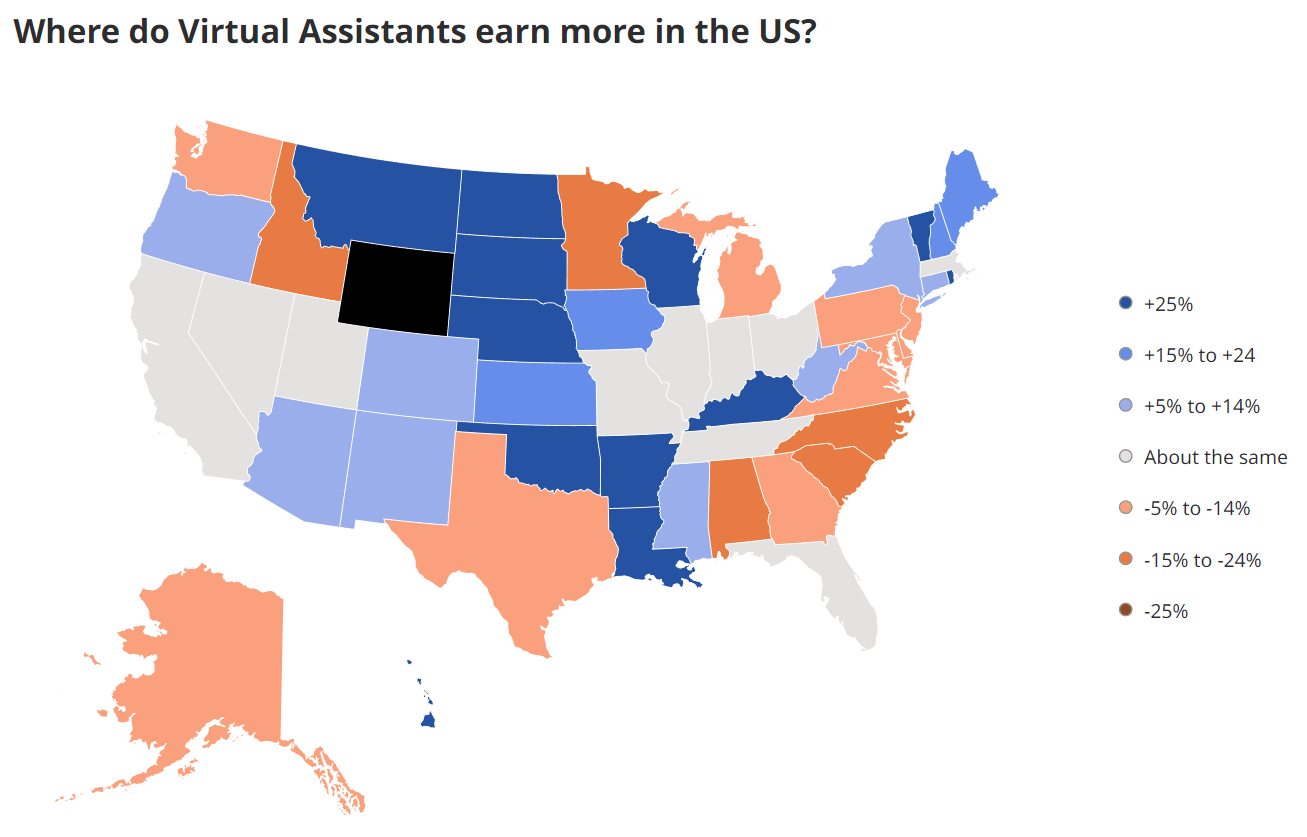
Virtual assistants in certain states earn far higher salaries than the national average:
Rhode Island: 63% more
Arkansas: 49% more
Louisiana: 43% more
North Dakota: 43% more
Oklahoma: 41% more
Kentucky: 36% more
Montana: 39% more
Wisconsin: 35% more
South Dakota: 32% more
Nebraska: 30% more
Vermont: 27% more
Virtual assistants in other states, such as Kansas, Iowa, West Virginia, New Hampshire, and Maine, also earn higher salaries, with most being between 15% and 24% higher than average.
On the other end of the spectrum, virtual assistants in states such as Alaska, Texas, Washington, Michigan, Georgia, Virginia, Pennsylvania, Maryland, and Delaware get paid 5–14% less than average.
Of course, virtual assistants in other countries can often be much more affordable than US-based ones.
Salary by experience
Virtual assistants with more experience also earn more. For example, VAs with 10–19 years of experience earn an hourly rate of up to $5 more than those with less than a year’s experience.
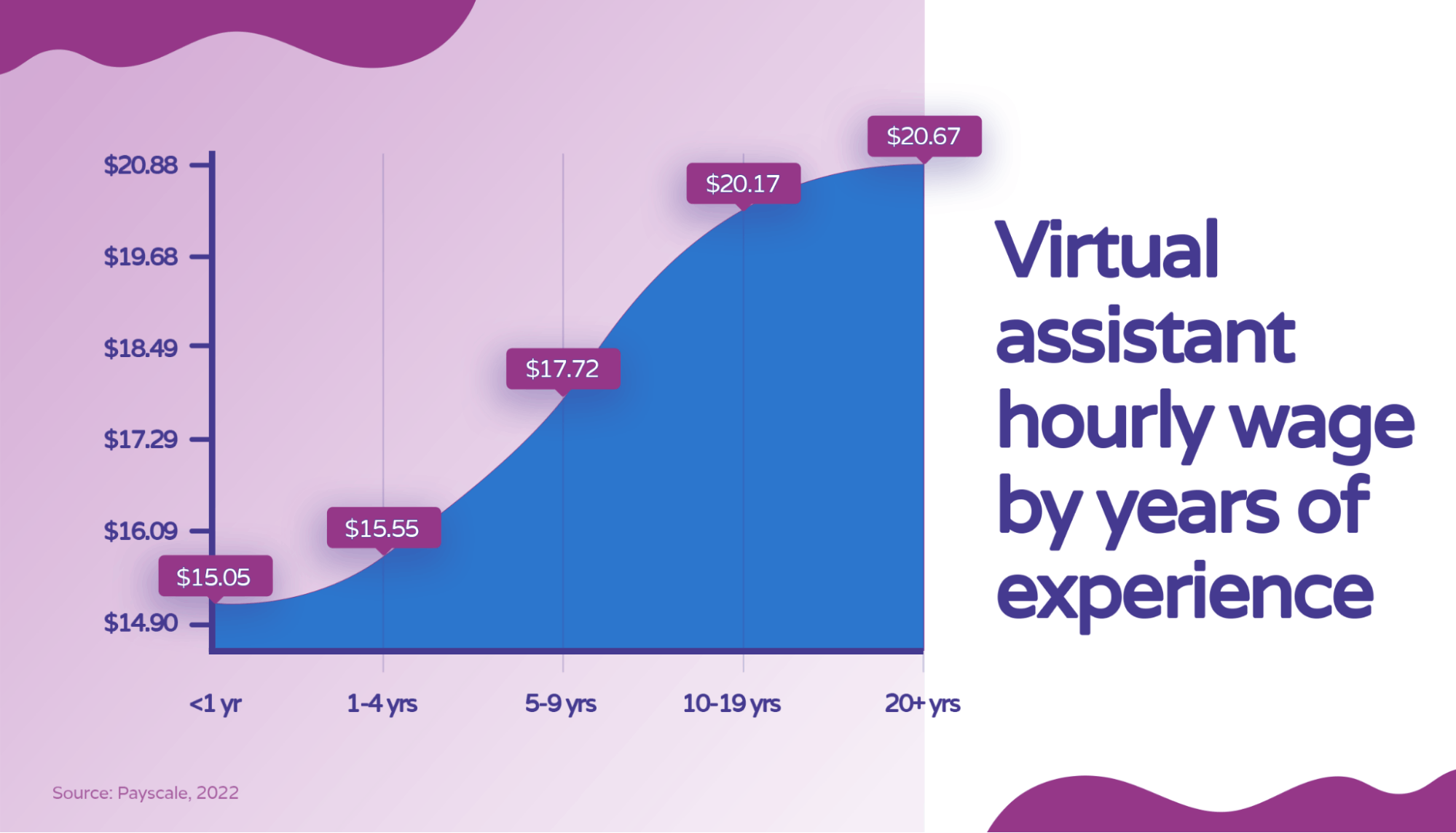
This may not seem like much at first glance. However, if you do the math, it means that these individuals get paid around $40 more per day and $800 more per month — which certainly adds up across months and multiple hires.
Salary by skill set
Like years of experience, virtual assistants’ hourly rates increase if they have certain skill sets. For example, VAs who have payroll administration skills can earn up to 46% more than average.
Furthermore, those with scheduling, graphic design, blogging, and Intuit QuickBooks skills can earn between 22% and 40% more.
At Hello Rache, we charge a flat fee of $9.50 per hour for our experienced, trained, and highly skilled virtual assistants who can help you with any tasks that you need. By sourcing skilled talent with medical certifications from the Philippines, we can help you keep payroll costs low without giving up on expertise.
What skills should you look for when hiring a virtual assistant?
Here are some of the top skills you need to look out for when hiring a virtual assistant.
Communication skills
A good VA will have exceptional communication skills regardless of whether they’re new to the job or have years of experience working in the industry.
Communication skills refer to not only oral communication but also writing since the VA will need to both talk to people over the phone and send emails.
As such, they need good grammar and spelling skills so that your practice will come across as professional and trustworthy.
Project management
Sometimes, VAs need to help develop and implement certain strategies and provide support for company projects. They also often need to assist with content creation and writing.
As such, they’ll be responsible for handling and assigning many projects at once, and they need to be able to manage all these projects whenever the employer requires them to.
Computer skills/technical skills
Virtual assistants use their computers on a daily basis to perform remote tasks. As such, they need to have advanced skills in using different programs and fixing their software or desktop if something goes wrong.
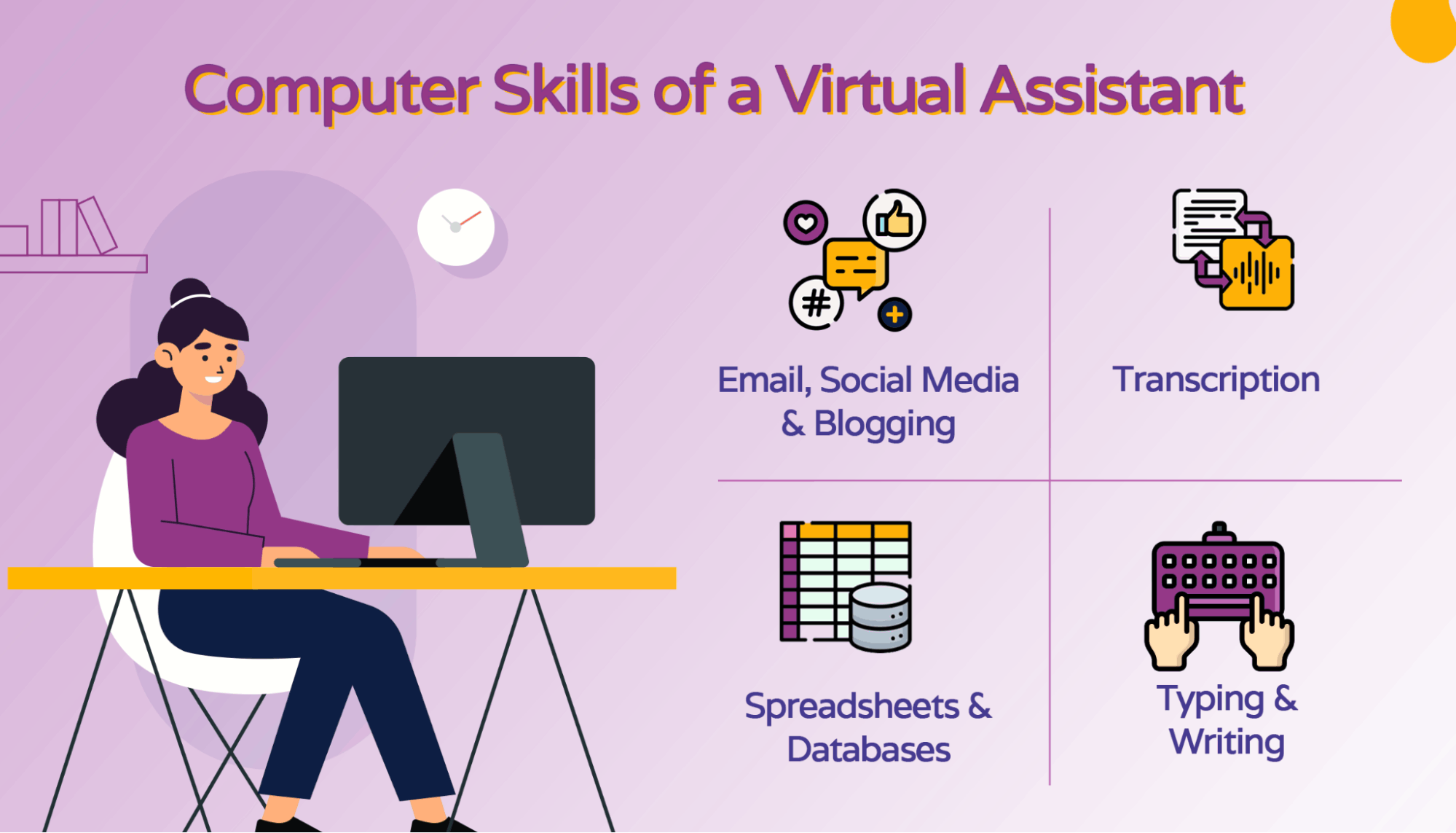
Virtual assistants have to be proficient in word processing, using the internet, and emailing, as well as know how social media platforms work. That way, they can help build your brand’s social media presence and attract more potential clients.
Time management
Since most virtual assistants have more than one client, they have to manage not only their own time but also their multiple clients’ schedules and tasks.
They have to keep track of all their clients’ schedules and be sure to reschedule appointments, make note of canceled appointments, and inform their employers of certain duties at the beginning of each day.
Customer service
Your virtual assistant will deal with customers every day — via both phone calls and emails.
Therefore, they need to have outstanding customer service skills. These include staying calm even when patients are agitated and fixing problems in a timely manner.
Above all, they need to be friendly and create a welcoming experience for all of your patients.
Data entry
Since your virtual assistant may be required to format documents, conduct research, enter customer information, organize files, and make data look presentable, good data entry skills are essential.
It’s even better if they also have fast typing skills so that data can be entered quickly and processes can flow seamlessly.
Multitasking
There are a lot of duties that need to be performed daily for different clients. As such, it’s best to have a virtual assistant who can multitask and handle many projects at once without getting overwhelmed.
They need to be able to answer calls, schedule appointments, and respond to emails, all while performing other duties that you require of them.
Knowledge of cloud-based apps
In 2021, the global cloud applications market was valued at $133.6 billion, and it’s expected to grow to $168.6 billion by 2025. This means that more businesses are now using cloud-based apps.
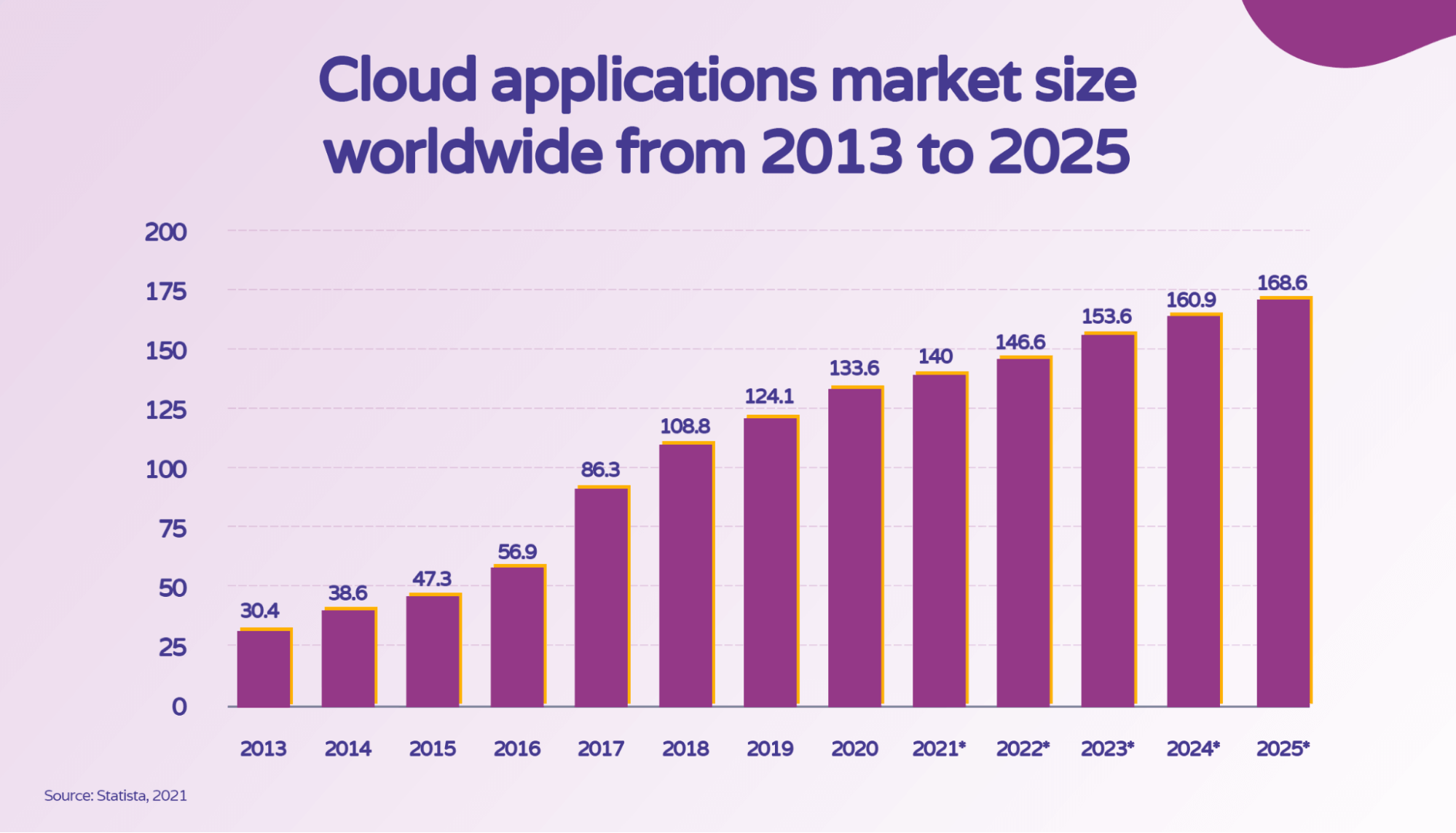
Cloud-based applications are quickly becoming the norm. Therefore, your VA needs to know how these apps work (or, at the very least, be a quick learner).
How to hire a virtual assistant
When it comes to hiring a VA, you have a few options. You can look for a virtual assistant on freelancer sites, as there are numerous independent contractors who advertise their services on those sites, or even put out a regular job ad.
Of course, finding the right match for your company is going to be a time-consuming process, just like with a regular hire (although the talent pool is greater).
Or, if you want to hire trained professionals without the headache, you could hire a Healthcare Virtual Assistant, Dental Healthcare Virtual Assistant, or Veterinary Healthcare Virtual Assistant from Hello Rache by booking a call with us right now.
Hiring a VA from Hello Rache means that you’ll get an assistant who’s educated and trained in the medical industry (like a registered nurse) — and therefore able to help you with all your tasks.
Our assistants have experience working with healthcare professionals and patients alike, and they are also great at assisting clients with all their healthcare-related queries.
Hire a virtual assistant today
There’s no need for you to handle all the tasks of your practice alone. By hiring a virtual assistant to help you, you’ll have more time to spend with your patients and increased flexibility to finally focus on the high-impact tasks that’ll grow your business.
Want to hire a virtual assistant but don’t know how it works? Learn how virtual assistant companies work and what you can expect from a VA.




